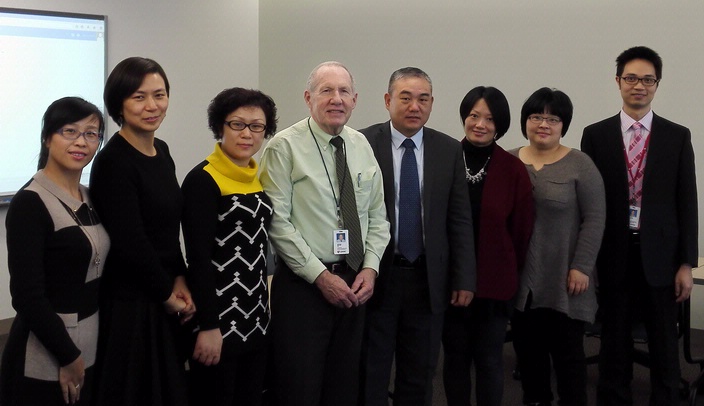A group of six administrators from Tongji University School of Medicine and its affiliated hospitals visited UNMC in early December. Though their visit was short – 10 days total – their goals were lofty.
During their visit, they met with UNMC leaders and faculty members to learn about UNMC’s curriculum, clerkship, research and medical education strategies. They also attended medical education training for the first- and second-year medical students.
Furthermore, they discussed expanding the existing research and educational collaborations between the two universities, which have continued for more than five years.
I had a chance to talk with Huxia (Susan) Shen, Director of the Education Administration Office for Undergraduate Programs, Tongji University, about their visit.
Why did you decide to come on this trip?
I came for two reasons. The first is that we are considering education reform at Tongji University School of Medicine, and I want to learn new things to help with those reforms. The second is that there are a number of joint programs between Tongji and UNMC, and there are talks about increasing these programs. People in our group will be called upon to be a bridge between these two schools so the programs will be successful. So we must know about UNMC and its programs.
What has been the most surprising thing about your visit to UNMC?
There are a few things.
One is the level of inter-professional learning opportunities. In China future doctors have limited chances to practice with future nurses and other health professionals. Here that happens with regularity. I would like to see this implemented at Tongji, or at least have a joint orientation so students in these different programs have a chance to meet and work together. It will be difficult to implement, but it is worth trying, I believe.
The second is that at UNMC students get a lot of clinical exposure from their first year in the program. They have chances to work with practicing health professionals to gain skills communicating with patients and to see what work in a hospital or clinic is like every week. In China, this often happens during summer vacation, for just two weeks each year for first- and second-year students. It is also surprising because the physicians are happy to host these students.
The third is the level of e-based learning at UNMC. Changing one’s way of thinking is difficult. Even at UNMC it has taken time to implement this, and it takes time for faculty to set these up to use in their classrooms. The modules we saw were 8-20 minutes. A type of e-learning has even been implemented in lectures. Faculty use clickers to build interactive lectures so students don’t just sit there; they are engaged with the lectures by answering questions.
What will you take back to China with you?
I’d like to take back Problem-Based Learning (PBL) cases and simulations. Tongji just built a new simulation center, so it would be nice to include some of these in these new facilities. I’d also like to strengthen earlier exposure to clinical settings.
What are some other differences you see between Tongji and UNMC?
Of course, the culture and systems at the two institutions are different. One of the big differences, from an educational standpoint, is the way that feedback is given to students. At UNMC it is common to give face-to-face feedback to students, to give them suggestions on how to improve in one-on-one meetings. In China, perhaps it is difficult to give face-to-face feedback – teachers might think that it would make the relationship colder to give feedback directly to students. They think that this might wind up inflating grades.
Did you attend the Chancellor’s Holiday Tea (Dec. 9)?
We did! It was nice to see the whole community come together to share food, celebrate, and even exchange ideas.
